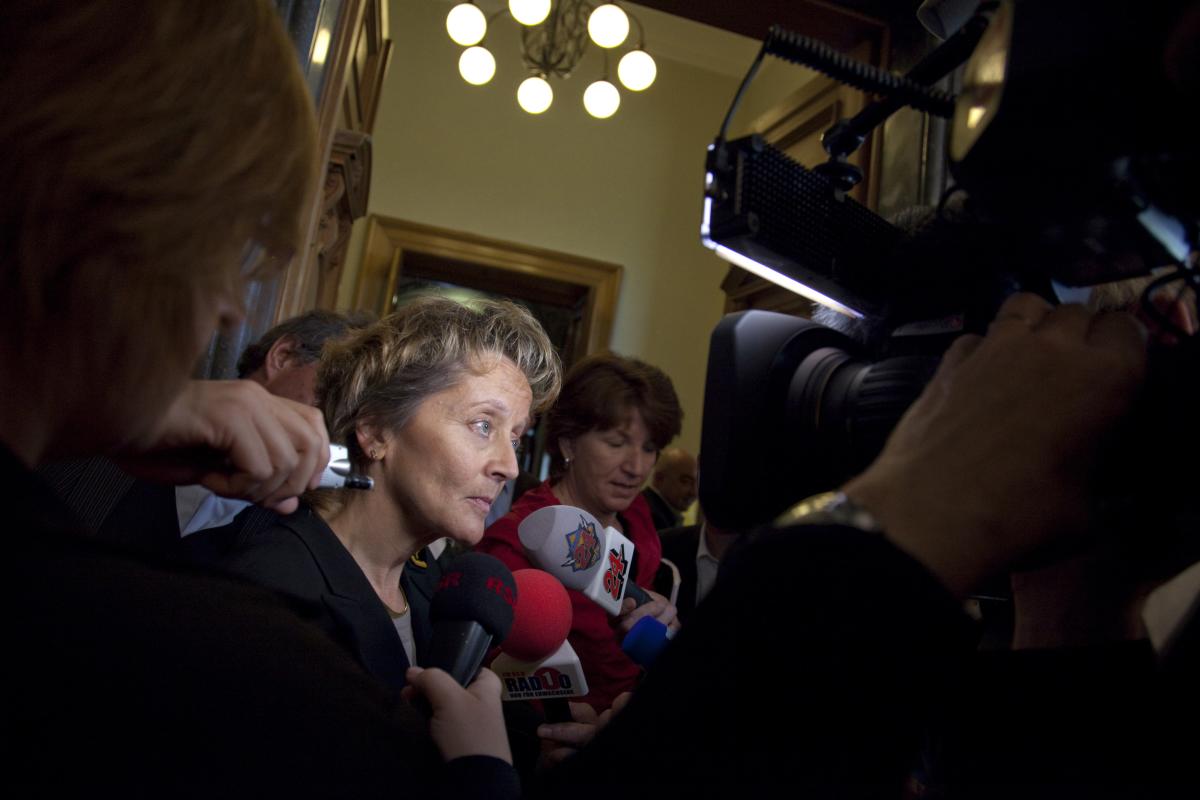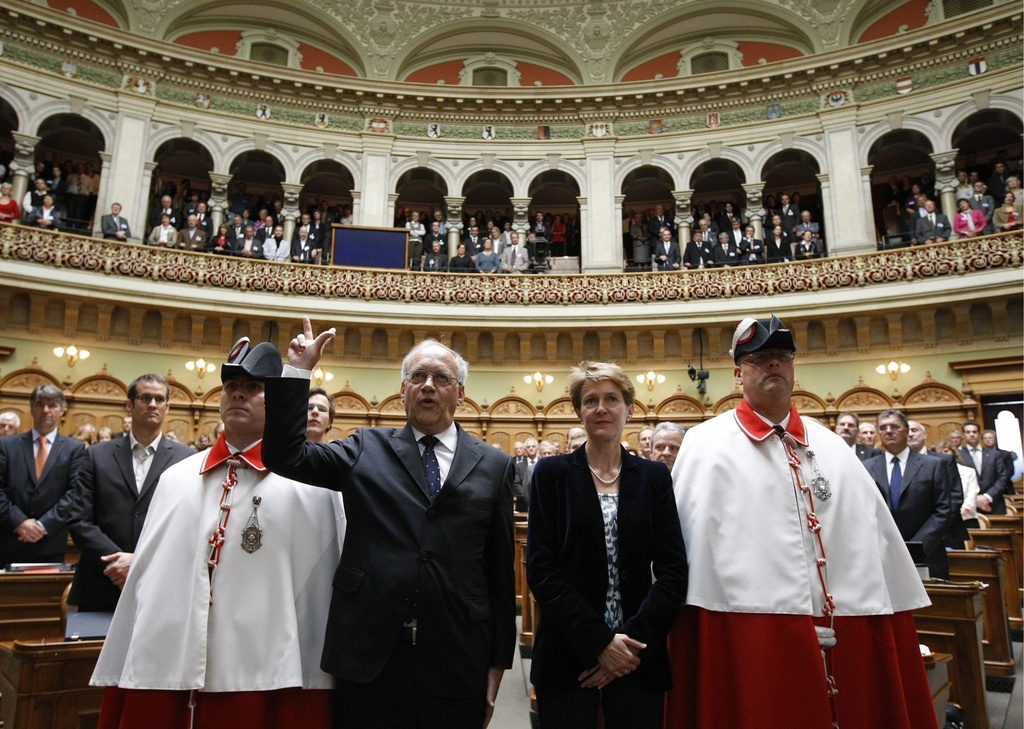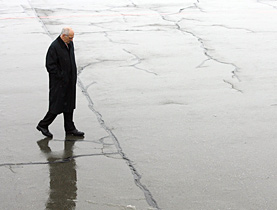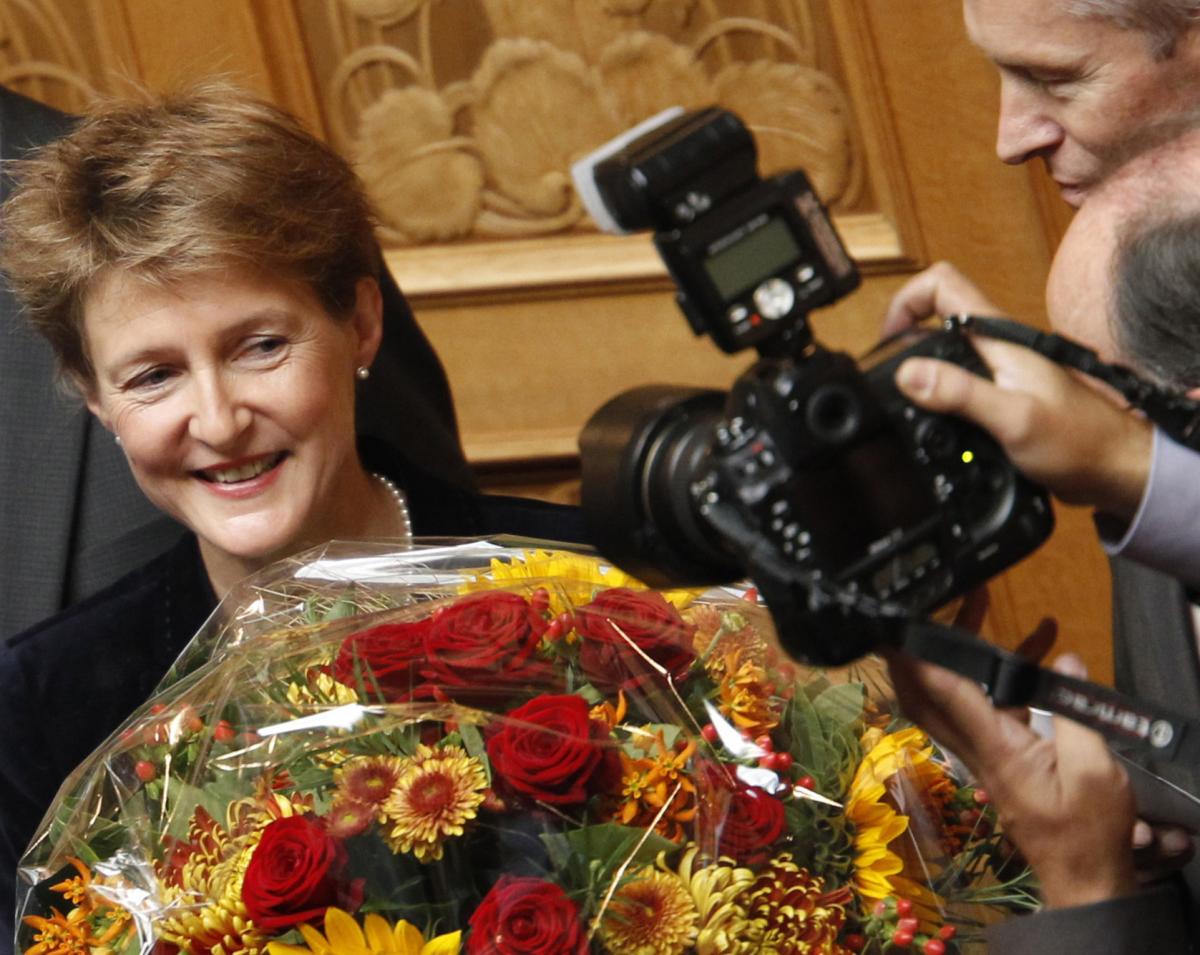Reshuffle of Swiss cabinet gets bad press

Monday’s major cabinet reshuffle is seen by the Swiss press as a setback for those who hoped for a fairer and less confrontational style of politics.
Most newspapers are highly critical of the decision to snub the centre-left and the rightwing parties in the reshuffle involving four of the seven ministries.
The mass-circulation Blick and the prestigious Neue Zürcher Zeitung describe the reorganisation as a “false start” for the new cabinet
“The cabinet is backing one member at the expense of another,” says the editorial in the NZZ. “This is not exactly a very promising beginning.”
Blick lays the blame on Economics Minister Doris Leuthard, whose decision to take over the key transport ministry triggered a series of other changes.
“The centre-right parties are doing a disservice to the country,” Blick says.
The Tages-Anzeiger and Der Bund, considered centre-left leaning, say there is no sign of a new era.
“There are no calmer waters in sight as many had hoped for. Instead the coming year promises to be stormy and the political system will be unnecessarily destabilised,” they say.
For its part the Berner Zeitung sees the decision by the new multi-party government – described as an “Unreasonable coalition” – as a long ball for the rightwing Swiss People’s Party ahead of next year’s general election.
“They don’t have to do much, because their opponents do it much better.”
Hollow words
The French-language Le Temps from Geneva is unequivocal in its editorial.
“Those who argued a majority female cabinet would produce harmony were proven wrong. The reshuffle has unknown consequences. The centre-right parties are taking a risk in sidelining the Social Democrats, who are in a minority in the cabinet. This is an obvious attempt to turn them into militants.”
The newspapers refer to the fact that the newly-elected Social Democrat Simonetta Sommaruga was left with the justice ministry, generally considered a less influential and unpopular portfolio.
The incumbent Eveline Widmer-Schlumpf, representing a small centre-right party, claimed the prestigious finance ministry instead.
“Appeals for a harmonious agreement sound more hollow than ever,” Le Temps says.

More
Consensus politics and power-sharing
Fools and martyrs
The cabinet decisions amount to treason, according to the editor-in chief of the Basler Zeitung.
He describes the political stage as a scene of backstabbing and jealous rivalry and argues the Swiss system of consensus is a “fairy tale told by fools”.
“The parties fight each other, no politician trusts the others. The government which was supposed to usher in a new era looks as old as the previous cabinet after only four days.”
For the Tribune de Genève and 24 Hours in Lausanne the reshuffle – the biggest in 50 years – augurs baldly for a consensus government and a spirit of moderation.
“Are the seven wise [cabinet ministers] puppets in the hands of party strategists?”, the editorialist asks.
It adds that Monday’s decisions are reminiscent of small children playing games with one of them picking the short straw.
There is the “Queen Doris [Leuthard], the poor wretch Eveline Widmer-Schlumpf saved from disaster and there is Simonetta Sommaruga as the martyr.”

More
Government, ministers, president
Storm in a teacup
Contrary to the opinions expressed in other dailies, several regional newspapers welcomed the reshuffle.
The Aargauer Zeitung praises the decisions as reasonable, albeit flawed.
The outcry by the centre-left and the rightwing parties is hypocritical, according to the paper, because “they have never shied away from tactical political manoeuvres in the recent past”.
But it is too obvious what Eveline Widmer-Schlumpf is trying to save herself by moving to the finance ministry, is says.
Her decision might even have sealed her fate. “She gambled away the support of the centre-left,” says the Luzerner Zeitung.
It’s a view supported by the Italian-language Corriere del Ticino. But it fails to see what all the fuss is about, describing the outcry as “a storm in a teacup.”
Justice: Simonetta Sommaruga
Economics: Johann Schneider-Ammann
Finance: Eveline Widmer-Schlumpf
Interior: Didier Burkhalter
Foreign: Micheline Calmy-Rey
Defence/sport: Ueli Maurer
Transport/energy/ communications/ environment: Doris Leuthard
Swiss cabinet ministers do not answer to their parties and there is no possibility to impeach them.
They are free to choose the moment of their resignation themselves and they enjoy a considerable autonomy in the cabinet.
The cabinet comes up for confirmation every four years in the wake of parliamentary elections.
The Swiss government consists of a cabinet made up of seven members.
There is no prime minister. The position of president rotates among cabinet ministers every year.
The cabinet should reflect the political, cultural and linguistic diversity of the country.
For 50 years cabinet posts were shared out among the four main parties – the Radicals, the Christian Democrats, the Social Democrats and the Swiss People’s Party – under an informal agreement.
The system known as the Magic Formula was thrown out in 2003.
A fundamental tenet of the multiparty cabinet is the need to reach consensus and that decisions are taken collectively.

In compliance with the JTI standards
More: SWI swissinfo.ch certified by the Journalism Trust Initiative






You can find an overview of ongoing debates with our journalists here. Please join us!
If you want to start a conversation about a topic raised in this article or want to report factual errors, email us at english@swissinfo.ch.